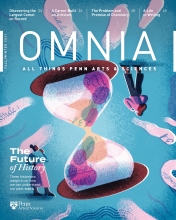Each one of your cells contains two copies of 23 chromosomes, one inherited from each of your parents. During meiosis—the cell division process that creates our reproductive cells (eggs and sperm)—our chromosomes (in blue) pair up along a filamentous spindle (in red), pulled by their centromeres (in green) to each side of the cell, which then divides, and later divides again. Normally, we think each copy of our chromosomes has a 50-50 shot of getting into eggs and sperm—but that’s not the case. Michael Lampson, Professor of Biology, and colleagues have shown that chromosomes can cheat, improving their odds of being passed down to the next generation. They’ve also recently found certain proteins that act to suppress this cheating in a kind of evolutionary arms race that pits advantage against equality. The implications could shed light on when meiosis goes awry, sometimes resulting in chromosomal disorders.
Image: Jun Ma




